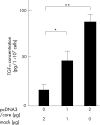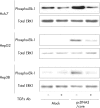Hepatitis C virus core protein promotes proliferation of human hepatoma cells through enhancement of transforming growth factor alpha expression via activation of nuclear factor-kappaB
- PMID: 16581947
- PMCID: PMC1856483
- DOI: 10.1136/gut.2005.070417
Hepatitis C virus core protein promotes proliferation of human hepatoma cells through enhancement of transforming growth factor alpha expression via activation of nuclear factor-kappaB
Abstract
Background: Hepatitis C virus (HCV) infection is a major cause of human hepatocellular carcinoma (HCC). The precise mechanism of hepatocarcinogenesis in humans by HCV is currently unclear. It was recently shown, however, that transgenic mice with the HCV core gene often develop HCC, suggesting tumorigenic activity of the HCV core protein. Further, the HCV core protein expressed in HepG2 cells transfected with the core gene was shown to stimulate proliferation of transfectants through activation of nuclear factor-kappaB (NF-kappaB). The downstream target molecule(s) of NF-kappaB activated by the HCV core protein to evoke cell proliferation is not yet identified. Transforming growth factor (TGF) alpha, which is often overexpressed in various tumour tissues such as HCC, has been shown to stimulate hepatocyte proliferation through activation of the mitogen-activated protein kinase or extracellular signal-related protein kinase (MAPK/ERK) cascade.
Aims: To explore the possibility that TGFalpha might be a target molecule for NF-kappaB activated by the HCV core, and that TGFalpha participates in the growth promotion of the core transfectants in an autocrine manner, activating the MAPK/ERK pathway.
Methods: A HCV core expression vector was transfected into human hepatoma Huh-7, HepG2 and Hep3B cells. NF-kappaB activity was examined by an electrophoretic mobility shift assay. TGFalpha transcription was assessed by a luciferase reporter assay. TGFalpha protein was determined by immunoblot and ELISA. MAPK/ERK activity was examined by an in vitro kinase assay. Cell proliferation was assessed by a water-soluble tetrazolium salt-1 assay.
Results: In the HCV core transfectants, NF-kappaB bound to the kappaB site in the TGFalpha proximal promoter region, resulting in an increase in TGFalpha transcription. Immunoblot as well as ELISA showed increased TGFalpha expression in the HCV core transfectants. SN50, a specific inhibitory peptide for NF-kappaB, cancelled HCV core-induced TGFalpha expression. HCV core protein increased cell proliferation as well as ERK activity of the HCV core transfectants as compared with the mock transfectants. The growth-promoting activity and activation of ERK by the HCV core protein were negated by treatment with anti-TGFalpha antibodies.
Conclusions: These results suggest that the HCV core protein promotes proliferation of human hepatoma cells by activation of the MAPK/ERK pathway through up regulation of TGFalpha transcription via activation of NF-kappaB. Our finding provides a new insight into the mechanism of hepatocarcinogenesis by HCV infection.
Conflict of interest statement
Competing interests: None declared.
Similar articles
-
Induction of high-molecular-weight (HMW) tumor necrosis factor(TNF) alpha by hepatitis C virus (HCV) non-structural protein 3 (NS3) in liver cells is AP-1 and NF-kappaB-dependent activation.Cell Signal. 2007 Feb;19(2):301-11. doi: 10.1016/j.cellsig.2006.07.002. Epub 2006 Aug 17. Cell Signal. 2007. PMID: 16916598
-
Menatetrenone, a vitamin K2 analogue, inhibits hepatocellular carcinoma cell growth by suppressing cyclin D1 expression through inhibition of nuclear factor kappaB activation.Clin Cancer Res. 2007 Apr 1;13(7):2236-45. doi: 10.1158/1078-0432.CCR-06-2308. Clin Cancer Res. 2007. PMID: 17404108
-
Hepatitis C virus core protein activates the MAPK/ERK cascade synergistically with tumor promoter TPA, but not with epidermal growth factor or transforming growth factor alpha.Hepatology. 2000 Nov;32(5):958-61. doi: 10.1053/jhep.2000.19343. Hepatology. 2000. PMID: 11050045
-
Liver stem cells: implications for hepatocarcinogenesis.Stem Cell Rev. 2005;1(3):253-60. doi: 10.1385/SCR:1:3:253. Stem Cell Rev. 2005. PMID: 17142862 Review.
-
Hepatitis C virus core protein modulates several signaling pathways involved in hepatocellular carcinoma.World J Gastroenterol. 2019 Jan 7;25(1):42-58. doi: 10.3748/wjg.v25.i1.42. World J Gastroenterol. 2019. PMID: 30643357 Free PMC article. Review.
Cited by
-
NADPH oxidase NOX1 controls autocrine growth of liver tumor cells through up-regulation of the epidermal growth factor receptor pathway.J Biol Chem. 2010 Aug 6;285(32):24815-24. doi: 10.1074/jbc.M110.114280. Epub 2010 Jun 4. J Biol Chem. 2010. PMID: 20525691 Free PMC article.
-
Suppression of human hepatoma (HepG2) cell growth by nuclear factor-kappaB/p65 specific siRNA.Tumour Biol. 2010 Dec;31(6):605-11. doi: 10.1007/s13277-010-0076-y. Epub 2010 Jul 14. Tumour Biol. 2010. PMID: 20628843
-
Mutations in the hepatitis C virus core gene are associated with advanced liver disease and hepatocellular carcinoma.Clin Cancer Res. 2009 May 1;15(9):3205-13. doi: 10.1158/1078-0432.CCR-08-2418. Epub 2009 Apr 21. Clin Cancer Res. 2009. PMID: 19383824 Free PMC article.
-
Hepatitis C virus-related hepatocellular carcinoma: An insight into molecular mechanisms and therapeutic strategies.World J Hepatol. 2012 Dec 27;4(12):342-55. doi: 10.4254/wjh.v4.i12.342. World J Hepatol. 2012. PMID: 23355912 Free PMC article.
-
Targeting MEK is effective chemoprevention of hepatocellular carcinoma in TGF-alpha-transgenic mice.J Gastrointest Surg. 2008 Jan;12(1):30-7. doi: 10.1007/s11605-007-0396-4. Epub 2007 Nov 7. J Gastrointest Surg. 2008. PMID: 17987349
References
-
- Di Bisceglie A M. Hepatitis C and hepatocellular carcinoma. Hepatology 19972634S–8S. - PubMed
Publication types
MeSH terms
Substances
LinkOut - more resources
Full Text Sources
Other Literature Sources
Medical
Research Materials
Miscellaneous







